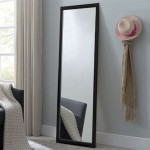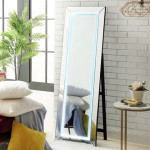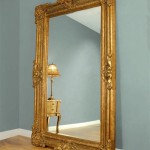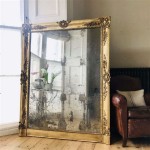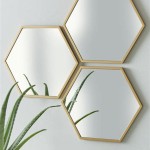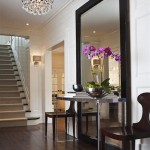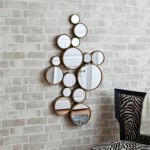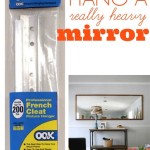Italian Baroque Rococo Floor Mirrors: A Glimpse into Opulence and Elegance
The Italian Baroque Rococo period, spanning roughly the 17th and 18th centuries, is renowned for its extravagant and ornate aesthetic. This artistic movement, characterized by its dramatic flourishes, intricate details, and emphasis on grandeur, profoundly influenced furniture design, including the creation of magnificent floor mirrors. These mirrors, far more than mere reflective surfaces, served as statements of wealth, refined taste, and a desire to create spaces that exuded an aura of opulence.
The Influence of Baroque and Rococo Styles
The Baroque period, marked by a preference for dramatic curves, bold ornamentation, and an emphasis on theatricality, laid the foundation for the development of opulent floor mirrors. These mirrors often featured elaborate frames crafted from richly carved wood, adorned with gilded surfaces, and embellished with intricate motifs like scrolls, acanthus leaves, and cherubs. The Rococo movement, which emerged as an offshoot of the Baroque, refined these designs, emphasizing a more delicate and whimsical aesthetic. Rococo mirrors incorporated lighter, curvilinear forms, playful asymmetrical patterns, and a palette of pastel colors, creating a sense of lightness and elegance.
Key Characteristics of Italian Baroque Rococo Floor Mirrors
Italian Baroque Rococo floor mirrors possess distinct features that set them apart from other styles of mirrors.
1. Elaborate Frames
The frames of these mirrors are perhaps their most striking feature. They are typically crafted from high-quality wood, such as walnut or cherry, and are meticulously carved with intricate details. The frame's surface is often gilded in gold leaf, creating a shimmering effect that catches the light and adds to the overall sense of grandeur. These frames often incorporate a variety of decorative elements, including:
- Scrollwork: Intertwining scrolls, often inspired by classical motifs, add a sense of movement and dynamism to the frame.
- Acanthus leaves: These stylized plant motifs, inspired by the Mediterranean acanthus plant, are a recurring element in Baroque and Rococo design, adding a touch of natural beauty.
- Cherubs and putti: These winged infants, symbolizing innocence and joy, are frequently incorporated into the frame's design, adding a playful and light-hearted touch.
- Cartouches: These decorative elements, typically oval or rectangular in shape, are often used to frame inscriptions or other decorative motifs.
2. Ornate Glass
The glass used in Italian Baroque Rococo floor mirrors is of high quality, typically featuring a clear, reflective surface. The glass itself may be adorned with decorative elements, such as etched patterns or painted scenes. These mirrors often incorporate beveling, a technique that creates a subtle sparkle and plays with light, enhancing the mirror's reflective qualities.
3. Decorative Finishes
In addition to the elaborate frames and glass, Italian Baroque Rococo floor mirrors often feature decorative finishes that further enhance their visual impact. These may include:
- Patina: A layer of aged, oxidized finish that adds a sense of history and depth to the frame.
- Lacquer: A shiny, protective coating that enhances the frame's color and luster.
- Marble or stone bases: Some floor mirrors are elevated on marble or stone bases, further emphasizing their grandeur and solidity.
Role in Interior Design
Italian Baroque Rococo floor mirrors played a significant role in interior design during their time. They were used to create a sense of spaciousness and grandeur in lavishly decorated rooms. The mirrors' reflective surfaces helped to bounce light around the room, illuminating the space and creating a sense of openness. They were also used to enhance the visual impact of ornate furnishings and artwork, creating a harmonious and aesthetically pleasing environment.
Today, Italian Baroque Rococo floor mirrors continue to be prized for their beauty and craftsmanship. They are sought after by collectors and interior designers alike, adding a touch of history, opulence, and elegance to modern spaces. Their presence in a room evokes a sense of timeless beauty and grandeur, reflecting the rich history and artistry of the Italian Baroque Rococo period.

Italian Baroque Rococo Style Full Length Floor Mirror In Gold With Reliëf

Italian Baroque Rococo Style Full Length Floor Mirror In Gold With Reliëf

Late 20th Century Italian Baroque Rococo Style Full Length Floor Mirror In Gold With Reliëf Chairish

Vintage Italian Baroque Rococo Full Length Floor Mirror In Gold With Scenery Chairish

18th Century Italian Baroque Style Floor Mirror

Best Er Floor Mirror Italian Baroque Rococo By Drginteriors Home Decor Interior Design

Vintage Italian Baroque Rococo Full Length Floor Mirror In Gold With Scenery Chairish

Italian Baroque Rococo Style Full Length Floor Mirror In Gold With Reliëf

Classic French Style Full Length Mirror Antique Silver Leaf Made In Italy Louis Xiv Baroque Rococo Ornate Item 5005

Italian Baroque Rococo Style Full Length Floor Mirror In Silver Leaf Finish Chairish

